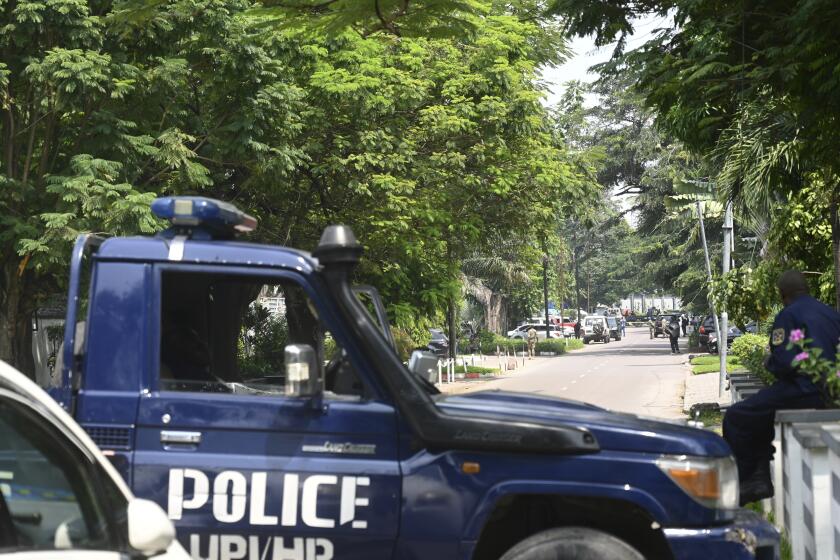THE NATION : THE CULTURE WARS : Tolerance? Social Justice? Gays See Rubber Gloves
This has been a rotten month for advocates of gay and lesbian rights.
First, the Administration decided against supporting a coming Supreme Court case that will determine whether a state can bar its cities from legally protecting homosexuals against discrimination in the same way that, say, Latinos or African Americans are protected.
Next, a group of gay and lesbian elected officials, arriving at the White House for a fence-mending session, found that the security guards checking their briefcases were wearing protective rubber gloves. Now, the Supreme Court has ruled that St. Patrick’s Day parade organizers do not have to allow homosexuals to march behind gay and lesbian banners.
In all these things, say gay spokespersons, the issue is homophobia. Would that it were so simple. Instead, such incidents warn us about what happens to tolerance, always an endangered value, when we insist on expanding each and every one of our often-contradictory rights and sensitivities until they can’t avoid starting fistfights with one another in the overcrowded public square.
Take the business of states and cities protecting homosexuals from discrimination. It would seem that this is the sort of elemental fairness that governments exist to enforce.
Nowadays, though, officially declaring a group protected against discrimination means much more. The new law creates a new basis for litigation. It leads to a larger enforcement apparatus. It carries the potential imposition of “goals” and “timetables” to ensure against evasion of the rules. It is often followed by increased intergroup conflicts.
In short, when compared with the old-fashioned idea of “fairness,” modern non-discrimination is a vastly more visible enterprise. More visibility means more friction. More friction means higher political costs to politicians who step in between contending camps. Ergo, the Clinton White House takes a pass.
Or, consider the rubber gloves, an insult if there ever was one--but not, it turns out, a violation of Secret Service policy, which allows White House guards inspecting packages to don the rubber.
And why are the guards granted this discretion? Because of a recommendation by the federal Occupational Safety and Health Administration.
This recommendation arose out of an incident a couple of years ago, in which a guard examining visitor belongings cut his hand on an object inside. We take workers’ rights to health and safety seriously these days. Indeed, we take everybody’s health-and-safety rights seriously; witness the speed and energy with which we have erected barriers against secondhand smoke.
So it is no surprise that once the health-and-safety issue was raised, the protective gear was approved. Thus, the guards acquired the means to make their political statement.
A couple of days later, gay protesters used similar rubber gloves to decorate the White House fence.
Finally, when the Supreme Court allowed St. Patrick’s Day parades to ban statements of homosexuality, it did so on the ground that a parade, despite the necessary role of public authorities in making it possible, is a form of speech. In other words, it is an essentially private act that the speaker has a right to control.
This is a vigorous, expansive use of the First Amendment--but, then, it is the version we’re used to these days. For instance, it is advocated by gay activists who protest the U.S. military’s current “don’t ask, don’t tell” policy toward them. These activists say a soldier’s declaration of homosexuality is speech, and is therefore protected under the First Amendment from censorship.
One man’s speech is another man’s poison.
In other societies, contradictions of this type might not produce such constantly recurring clashes. The Japanese, crowded together, have resolved the consequent potential for mayhem by making virtues of homogeneity and consensus. Europeans, when compared with Americans, operate with relatively fixed identities that are not so open as ours to arguments and pressures from other groups, beliefs and life styles.
Such differences were not so grating at other times in our own country. In the pre-World War II segregated South, residential neighborhoods were more racially integrated than they later became--because the distinctions between blacks and whites were deemed so obvious and immutable that having houses close together posed no threat.
But America, past and present, has relatively few such buffers, distinctions or accommodations to offer.
The country’s thoroughgoing democracy makes it impossible for most citizens to live in homogeneous groups and avoid looking over the horizon at others who are different. This lack of boundaries breeds anxiety; that is one reason why the politics of scandal and conspiracy are endemic in American political history. The same anxiety makes Americans feel a need to create their own limits; that, and not just a Puritan heritage, is the source of our oft-remarked moralism.
These traits mark American political behavior in policy areas. They are on display now in the umpteenth round of the national fight about sex and violence in the mass media. They were inescapable in Oklahoma City.
But such tendencies are perhaps at their most violent when it comes to the issue of homosexuality, which makes other group politics look like bean bag.
For one thing, this is a conflict based on not just some group’s physical characteristics--as with race--or beliefs--as with religion--but concrete desires and actions: It thus has a particular immediacy. This tension also inhabits an area of the psyche that, for many people, is the one most private and filled with fear. Then, of course, there is the so-far intractable matter of the Bible.
To say we can resolve these discords through education, the benign effects of time and the sincere efforts of all people of goodwill is--well, not realistic.
We can, however, do the American thing. We can give one another as much room as humanly possible. We can also remind each other, in as many ways as necessary, that people should damn well leave each other alone. Such messages are not the noblest, but they have worked, more or less, over the long run.
However, this is a strategy that is near-impossible to imagine, let alone put into effect, in the current climate of competitive self-righteousness. If everybody’s rights are inviolable, and everybody’s space expanding, and everybody is seeking remedies for ever more subtle forms of harm, and everybody is taking everything to court, there are simply no spaces in between us where tolerance can find a home and settle in.
In this imperfect world, does the search for more social justice beget less of it? A part of what we saw this month may have been homophobia at work. But a larger part was the ugly, punishing sound of social gears set too close together and grinding one another into the ground.
More to Read
Start your day right
Sign up for Essential California for news, features and recommendations from the L.A. Times and beyond in your inbox six days a week.
You may occasionally receive promotional content from the Los Angeles Times.






